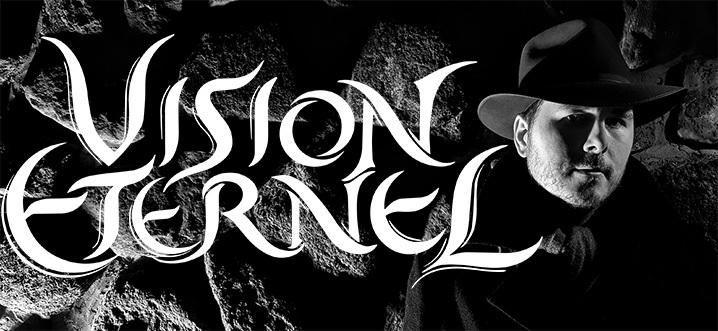
You can support Terra Relicta by donating! Please, do so, and thank you!

The Canadian/American act Vision Eternel, a solo project of songwriter Alexander Julien, has released a new cinematic concept work of art this September, the EP named For Farewell Of Nostalgia. This is maybe the most elaborated and most personal work to date in Vision Eternel discography. Alexander formed Vision Eternel back in 2007, as a project where his endeavours in ambient, ethereal, minimal, emo, post-rock, post-metal,... waters can find its home. Alexander describes the music of Vision Eternel as "melogaze". The meaning of this, as well as many other things regarding Vision Eternel, the latest EP For Farewell Of Nostalgia, something about his other musical projects and bands, and yet more that you need to know about this exceptional act, can be read in this in-depth interview where Alexander gave us the most detailed answers as he could.
Interview with: Alexander Julien
Conducted by: Tomaz
Edited by: Jerneja
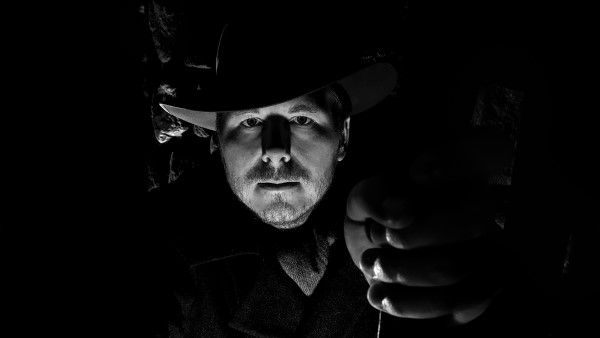 Tomaz: Even though Vision Eternel has been around since 2007, and has already released a plentiful discography, it remains quite an unknown name for a lot of fans of dark music. Please tell our readers more about Vision Eternel.
Tomaz: Even though Vision Eternel has been around since 2007, and has already released a plentiful discography, it remains quite an unknown name for a lot of fans of dark music. Please tell our readers more about Vision Eternel.
Alexander: I started Vision Eternel in January 2007 as an ambient side project while playing in two black metal bands: Vision Lunar and Throne Of Mortality. I also had two other solo projects; Soufferance, which played dark ambient, and Vision Solitude, which played dark folk. Today, I consider Vision Eternel to be my principal band, but in 2007, it was just one of the many bands that I was part of. Vision Eternel came about somewhat by accident. I was playing the guitar and experimenting with new effects and recording styles at the newly-built Mortified Studio in Edison, New Jersey, United States when I began coming up with these really beautiful, short pieces. I was not trying to copy any style or genre; I was just playing things that sounded honest and heartfelt to me. The first song that I composed was "Love Within Beauty"; then a few days later "Love Within Isolation" and I immediately knew that it was the beginning of something different from my other bands. These songs were very emotional and touched on a personal subject that was dear to my heart; they documented the depression that I was going through because of a failed relationship. In less than a month, I had Vision Eternel's debut concept extended play ready; Seul Dans L'obsession was released on February 14, 2007, for Valentine's Day, and I directed a music video for the single "Love Within Narcosis". Even though Vision Eternel was extremely personal and centred around my own experiences and heartbreak, I started looking for members to turn it into a full band. The first person to join was one of my best friends Philip Altobelli. But he was transitioning from a metal guitarist to a classical guitarist so he ended up leaving the band after only a brief period. I then spent the spring and summer of 2007 composing Vision Eternel's sophomore concept extended play, Un Automne En Solitude. That second release was held back from release because I did not want to have two releases out in the same year. At the end of the summer of 2007, I moved to Montreal, Quebec, Canada, and in early 2008 I tried to build up Vision Eternel into a band once again. Two new guitarists joined: Adam Kennedy on lead electric guitar and Nidal Mourad on acoustic guitar; with that line-up, I switched from lead electric guitar to rhythm electric guitar. The music started sounding more like a mix of indie rock and post-rock, but nothing that could be compared to other bands because none of us listened to those genres. I really liked the direction of the new music but Nidal left, then Adam and Vision Eternel became my own band again. I then released Un Automne En Solitude on March 14, 2008; it was promoted with the single "Season In Absence", which had two different music videos. That second release attracted the attention of the Japanese record label Frozen Veins Records, which released a compilation of the first two extended plays with a poster for the Japanese market. The compilation, An Anthology Of Past Misfortunes, came out on February 14, 2009. That year, I also recorded Vision Eternel's third concept extended play, Abondance De Périls, which was released on March 9, 2010, through my own record label Abridged Pause Recordings. I spent the next two years struggling with Vision Eternel while I played in different bands. I thought that perhaps the days of Vision Eternel had come to an end, so when I worked out the next concept extended play, The Last Great Torch Song, I asked several friends to contribute guest parts. I thought that if this was to be the band's swansong, it would end things well. The Last Great Torch Song was released on March 14, 2012, and featured Garry Brents on keyboards, Alexander Fawcett on guitar and bass, and Eiman Iraninejad and Howard Change providing spoken word vocals. In the summer of 2014, I was approached by an acquaintance to compose the soundtrack to a short film. I composed and submitted a fourteen-minute soundtrack, but quickly found out that the producer/director/screenwriter of the project had instead used the funds to finance his own vacation to Europe. I really loved the new music that I had recorded, and I did not want it to be abandoned, so I went back into the studio to edit, partly re-record and fully re-mix the soundtrack into an extended play. The music sounded very close to Vision Eternel so I decided to release it through that band; Echoes From Forgotten Hearts was released on February 14, 2015. Between 2017 and 2018, I compiled the retrospective boxed set An Anthology Of Past Misfortunes (unrelated to the Japanese compilation of the same title), which compiled Vision Eternel's full discography up to that point. It was made to highlight the tenth anniversary of the band, along with a music video for the song "Pièce No. Trois". As soon as that was released, I began working on Vision Eternel's sixth concept extended play, For Farewell Of Nostalgia, which was finally released, after almost four years of work, on September 14, 2020.
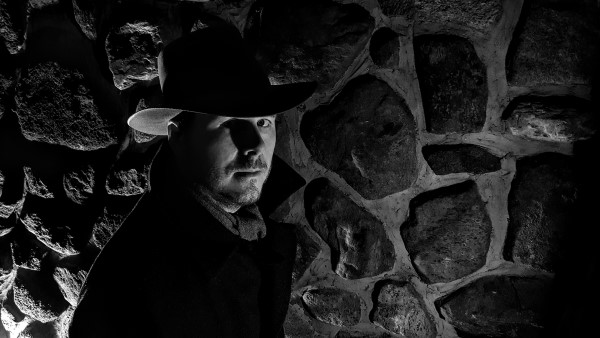 Tomaz: I see that the new EP is done completely by yourself, no guest musicians this time. Why such a decision?
Tomaz: I see that the new EP is done completely by yourself, no guest musicians this time. Why such a decision?
Alexander: Vision Eternel started as a one-man band; it had to because it was used to document a past relationship from which I was unable to recover. It was not as simple as having a single song that talked about a broken heart surrounded by the rest of an album; it was a full, conceptual extended play dedicated to a past girlfriend, with each song representing the different phases that I went through, from meeting her to losing her. It was a story that could only be told from one perspective. Thankfully though, it was also a story that listeners everywhere could relate to because almost everyone has experienced heartbreak. When I composed the second extended play, a few months later, it was a continuation of that same story-line. It was about another girlfriend, one whom I had met shortly afterwards, and the emotional pain that I suffered from that break-up too. Combining the two releases gave a "Boy gets girl, boy loses girl. Boy gets girl again, boy loses girl again" situation; a theme that is explored in my favourite movie, Alfred Hitchcock's Vertigo. Each new Vision Eternel concept extended play is a continuation of that story-line, dedicated to a different ex-girlfriend and forever documenting, audibly through music, the love, the pain and the memories. When Philip Altobelli practised with Vision Eternel, it was more-or-less on an experimental and rehearsal level. I do not mean that in a bad or unprofessional way. Phil was (and has remained) a huge fan of Vision Eternel, and I feel that he perhaps understands it better than anyone else, because he was there during my entire relationship with the girl about whom the first release was written. We met her together. So when I invited him to practice Vision Eternel songs, I knew that he understood the emotions that had gone into it and he was respectful of that. He never would have imposed his ideas, partly because it is not within his character to do that, but also because he knew how much Vision Eternel meant to me. It was actually Phil's idea to perform guitar solos on top of the basic guitar tracks that I had recorded; he was a much better guitar player than I. He became a classical guitar teacher. But Phil and I had the benefit of only performing songs that I had already composed. It would be difficult to determine, in hindsight, how the core and ideals of the band would have changed had we gotten to the point of composing new songs together. When I moved to Canada and recruited Adam Kennedy and Nidal Mourad, it was because I was hoping to play shows. I had met Adam and Nidal at Recording Arts Canada, an audio production college in downtown Montreal. The three of us were new to Montreal; I had been living in New Jersey; Nidal was from Slave Lake, Alberta, Canada; and Adam was from Ottawa, Ontario, Canada. I thought that we worked very well together and the songs that we practised developed extremely quickly. Again, these were not new songs written as a trio, these were songs from Vision Eternel's second extended play, Un Automne En Solitude, which we were improving and re-arranging. We built up-on songs that I had already composed. At the time, Un Automne En Solitude was fully recorded but unreleased; as soon as I heard how amazing, and different, these songs had become with the band, I strongly considered shelving the release or keeping it as a demo (instead of a concept extended play, as it had been written). The reasoning in my mind was that Vision Eternel was evolving into something else, and I was open to the idea of changing the band's name because Vision Eternel signified "me" and "my story". It did not have much room for other people's input. But Nidal quit, then Adam and I stopped practising together, and I continued to work alone through Vision Eternel. When I was finished recording Vision Eternel's third concept extended play, Abondance De Périls, I asked Adam Kennedy to master it and my roommate Marina Polak to provide a photograph for the cover art. Up until that point, I had never worked with anyone else on Vision Eternel's released material. I was the composer, performer, producer and artwork designer. But I felt that Abondance De Périls could use a little bit of help. It was a very difficult decision for me to make because I was very controlling of every aspect; I felt that it had to reflect my emotions and my story just right. I approached the same people for Vision Eternel's fourth concept extended play, The Last Great Torch Song. Marina Polak's picture was also used for the cover art, but Adam was not available for the mastering. During that phase, I was unsure of Vision Eternel's future. I thought that perhaps it would be all over after that release. So I really wanted it to be special, but I felt that the songs were missing something. So I approached about twelve to fifteen of my close musical friends and asked them to contribute something to the songs. I was hoping for this massive collaborative release, but unfortunately, a lot of them were unreliable; only four of them recorded their parts in time for the deadline. But those parts were incredible! Garry Brents added keyboards to "Sometimes In Longing Narcosis", Alexander Fawcett added guitar and bass to "Sometimes In Anticipating Moments", Howard Change added a spoken word poem to "Sometimes In Absolute Togetherness", and Eiman Iraninejad added a spoken word poem to "Sometimes In Longing Narcosis". Those songs all became completely different from their contributions; they took lives of their own. Garry Brents also wound up mastering the release, so I got to work with an all-new team on that release. Echoes From Forgotten Hearts was originally composed as a soundtrack, so I did not think of approaching anyone else; it was not needed. By the time that I was composing and recording For Farewell Of Nostalgia, from 2017 to 2019, I had grown displeased with band members and collaborators. This was not something that stemmed from Vision Eternel specifically, it was in general; it was something that I did not enjoy dealing with. Over the years, so many of my bands were forced to pass up incredible opportunities simply because a member was unreliable. I wanted Vision Eternel to be self-sufficient; that was an important factor for me. But most importantly, once For Farewell Of Nostalgia was recorded and mixed (for the second time) in 2019, it sounded perfect to me. Everything was just right, so I was not thinking about collaborations. The only person that I thought could improve the release at that point was Carl Saff at Saff Mastering. I was listening to Castevet's album The Echo & The Light one day, and I immediately thought that the person who mastered that release should master For Farewell Of Nostalgia. Carl has mastered all Castevet releases, so I was really excited to work with him. It was my first time working with a true mastering engineer. Adam and Garry are both great producers, but their studios are set up for recording and mixing. Carl's studio was built specifically for mastering, so it has an advantage over recording and mixing studios.
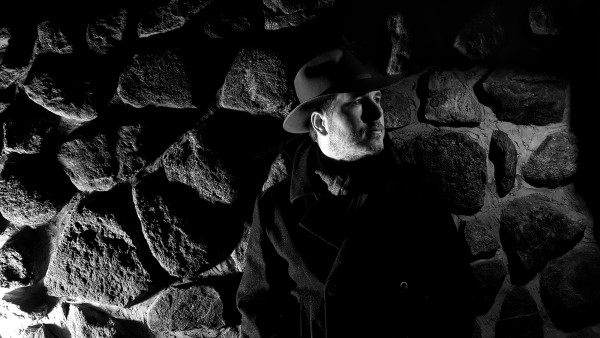 Tomaz: For Farewell Of Nostalgia is a meaningful title. Tell me more about it and what exactly did you mean by it?
Tomaz: For Farewell Of Nostalgia is a meaningful title. Tell me more about it and what exactly did you mean by it?
Alexander: The title For Farewell Of Nostalgia was conceived pretty early on with this release, while I was composing and demoing songs in 2017; but it was not revealed until late in 2018 when the first version of the extended play was nearly completed. I was rather secretive about it and that was because of two things. First, I once revealed a work-in-progress album on social media by one of my past bands and its title and concept were stolen by another band. This other band had already recorded their release and simply pasted on the title and concept that I had worked out on top of their unrelated music, then quickly released it digitally, claiming that it was their own idea. So I have been very careful of when and how much I reveal; the release has to be very close to completion before I announce official titles. The second reason, and definitely one more important to me, was because I was not sure if I was entirely happy with the title. Nostalgia has been a very important and meaningful state of emotion throughout my life and it was extremely important that I was able to represent it honestly and respectfully. Having the word nostalgia is not only a song title ("Moments Of Nostalgia") but also the release title (For Farewell Of Nostalgia), meant that the music had to live up to it. A lot of artists like to use words in titles merely for effect; for what it projects. But for Vision Eternel, the title of a release is fully tied into the concept of the release itself; these words connect the release with the songs, with the emotions during the time of composing, with the emotions during the time of recording, and with the story-line that Vision Eternel follows. It also has to be appropriately represented with the artwork, and in the case of this particular release, with the short story that is accompanied. Everything that Vision Eternel does is so conceptually connected that a lot of thought and planning goes into it; none of it is last-minute or an afterthought. One of the lengthy processes of choosing a release title for Vision Eternel is making sure that it is original. During the composing and recording sessions, I note words that I feel are representative of the emotions that I am feeling and of the themes that are explored in the release. Once I have a few words collected, I play around with the phrasing until I get a result that sounds right to me. Vision Eternel's release titles have a certain rhythm, like a short statement-of-fact. I then extensively research the title that I came up with; if it is too similar to anything already used by someone else, I discard it. It is important to me that when people look up the title on Google, my release is the only result that appears. The meaning of For Farewell Of Nostalgia is intended to be taken with slight poetic liberty. I wanted it to read as for the well-being of nostalgia, slightly phrased in an old-fashioned English style. This concept extended play documents a lot of emotions that I look back on fondly, even though they may have been painful at the time. It is both a recollection of a past relationship and a Dear John letter to Montreal, a city that I lived in for many years. It is my way of saying "Thanks for the memories; the wonderful and the miserable; now good-bye." I am in no way forgetting these memories; I am instead stating that I will be looking back on them affectionately, in nostalgia.
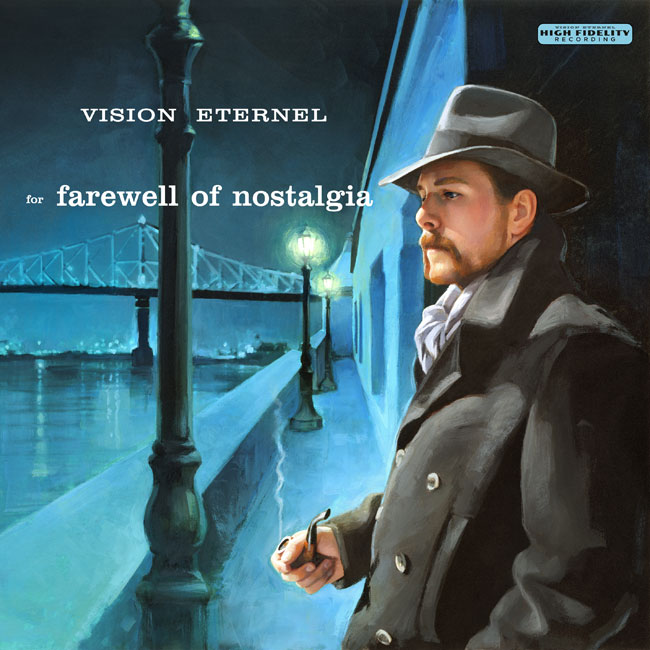 Tomaz: And I guess that this original cover artwork and everything that surrounds it is also very tied within the whole concept?
Tomaz: And I guess that this original cover artwork and everything that surrounds it is also very tied within the whole concept?
Alexander: The artwork to Vision Eternel's For Farewell Of Nostalgia is definitely tied into the concept. It is adapted from the cover art of Frank Sinatra's album In The Wee Small Hours, and there is a story to that. For Farewell Of Nostalgia was recorded twice; once in 2018, then again from scratch in 2019. I was not happy with the way that the original version sounded; it sounded more like a compilation of random songs rather than a concept extended play. One of the causes was that it took me so long to compose and record the songs that my mood and motivation changed over time. Each song had a different atmosphere. When I decided to re-record For Farewell Of Nostalgia in 2019, I isolated myself in my studio to contain my mood, so that I would have the same emotions from the beginning to the end. That second recording session lasted from early October to mid-November 2019; so for that month-and-a-half, I controlled what I listened to, what I watched, what I read, who I spoke to and what I saw. In order to contain my mood, I decided that I would not listen to any music during the re-recording session (I resumed listening to music later, during the final mixing stage). I also placed two pieces of art, which I knew would help to keep me nostalgic and sad, next to my computer. The first was a painting of my grandparent's cottage, which holds some of my fondest childhood memories; the second was Frank Sinatra's In The Wee Small Hours album sleeve. The album had kept me company, like a caring best friend, on late lonely nights dealing with heartbreaks. I had listened to it extensively over the years and it was a form of comfort. I took Frank Sinatra's influence one step further; I limited myself to solely watching his films during the month-and-a-half re-recording session. He is one of my favourite actors; he has calming confidence and deep sadness that shines in his dramatic roles in films like From Here To Eternity, Some Came Running, The Manchurian Candidate, The Man With The Golden Arm, Pal Joey and The Detective. I watched those films, and others, over and over again during the re-recording of For Farewell Of Nostalgia and it kept me just sad and nostalgic enough to be creative. It helped all of the songs sound like they came from the same recording session because I was able to maintain the same mood. When considering the cover art for Vision Eternel's For Farewell Of Nostalgia, it seemed so obvious; pay homage to Frank Sinatra. He had made it possible for this release to come together. I immediately thought of basing it on In The Wee Small Hours', but I did not want it to be an exact duplicate. I wanted people who were familiar with Frank Sinatra's album to immediately see the connection, but I did not want it to be as simple as my face drawn over the original cover; that would have been disrespectful. I wanted the cover art to represent me, Vision Eternel and the sadness that went into the music. On Frank Sinatra's cover, he is the main focus. The street scene behind him could be anywhere, it is nondescript, and perhaps that was the point. But since Vision Eternel's For Farewell Of Nostalgia is partly a Dear John letter to Montreal, I thought that it was important that the cover artwork represent that city. Montreal had been such an important part of my late teenage and early adult life; Vision Eternel will always have a symbolic link to that city. So there are several notable Montreal landmarks in the background: the Saint Lawrence River, the Montreal Harbour Bridge, the Sailors' Memorial Clock Tower on Victoria Pier and my favourite building, Windsor Station. I had to restrict the number of landmarks to include because I did not want to bloat the image. It had to remain relevant to In The Wee Small Hours. Another aspect of the cover art that I wanted to adapt was with regards to the figure; me. Frank Sinatra was painted as himself on his artwork, so I wanted to be myself as well. Instead of trying to find clothes that matched Frank Sinatra's, I wore my own for the photoshoot. I wore my overcoat and scarf (instead of a suit and tie), one of my own wide-brimmed fedoras (instead of a narrow-brimmed fedora), I smoked my pipe (instead of a cigarette) and I did not shave off my horseshoe moustache. Once I had a composite image of the artwork, which was compiled from several photoshoots done with Jeremy Roux and Rain Frances, I contacted several different illustrators. I wanted to find someone who was able to paint pulp-style artwork, and only a handful of artists can really get it right nowadays. One of them is Michael Koelsch. I discovered him because of his work with The Criterion Collection; he illustrated a couple of their releases. But he also did a lot of film posters, book covers and even some album covers in the early 1990s for established bands. Michael Koelsch was already a fan of Frank Sinatra and knew In The Wee Small Hours well, so he was very excited to work on the project and bring in his own emotional connection. He painted a full 16x9 piece which I used for the front and back cover. The original painting turned out nicer than I could have possibly imagined. It is by far the best artwork I have ever had on any of my releases (by any band). I am already looking forward to working with Michael Koelsch on Vision Eternel's next release. There is one more piece of artwork that is very important to the concept and that is the painting used for the short story booklet. That was painted by Rain Frances and it has a beautiful sadness to it that works really well with the mood of the short story. The painting starts out slightly brighter, more vibrant at the beginning of the story, but it gets very dark by the end of it. Rain also provided different paintings for the other physical editions. For example, on the advanced CD edition, the CD face has a paint splatter; on the CD edition, the back of the short story booklet has another painting; and finally, the cassette edition has yet another artwork on the sticker of the bonus tape Lost Misfortunes: A Selection Of Demos And Rarities (Part Two). Rain Frances had previously painted the artwork for Lost Misfortunes: A Selection Of Demos And Rarities (Part One) in 2017, so it was important for me that I return to the same person for the follow-up.
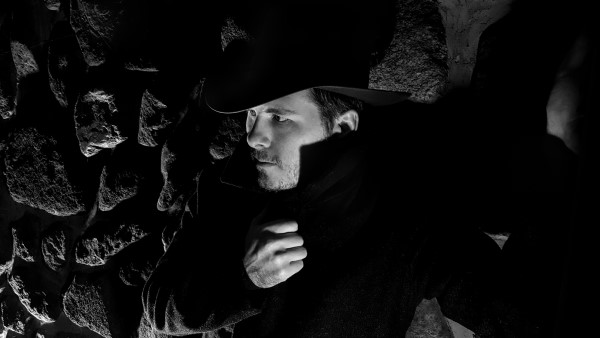 Tomaz: If I'm not mistaken, your first musical endeavours were in black metal bands, right?
Tomaz: If I'm not mistaken, your first musical endeavours were in black metal bands, right?
Alexander: I did not actually discover black and death metal until the autumn of 2004, and by that time, I had already been playing the guitar for nearly two years and had also been in a few bands. My very first band was called Les Rocker's, which I believe was active around early 1999, and consisted of my sisters and I playing cover songs, most notably The Offspring's "Pretty Fly (For a White Guy)". I wish that I could recall some of the other songs that we played. We performed when family members visited. After receiving my first real guitar in December 2002, I started composing my own music. From June 2003 to January 2004, I played in The Slopin Fairy 7, which was a mix of what I had been listening to during the previous four years: punk rock, alternative rock, nu-metal, industrial metal and britt pop. In the summer of 2003, I also played in the acoustic folk duo The Tom & Alex Project. I then played in the nu-metal/metalcore band Scapegoat from roughly April to October 2004. I continued to compose music on my own from late 2004 to the summer of 2005 but I had difficulty finding band members. In the summer of 2005, I started a new band which eventually became Throne Of Mortality. For the first couple of months, Throne Of Mortality played death metal, but I quickly found that I was enjoying, and more apt at playing, black metal. So Throne Of Mortality became my black metal band and I started Projection Mina for my death metal and thrash metal songs. Throne Of Mortality eventually broke up in January 2007 while Projection Mina lasted until November 2007. Within that time, I also started several other bands and side projects. Soufferance was a dark ambient band that started in September 2006 and is currently on permanent hold. Vision Solitude was a dark folk project which began in October 2006 and existed sporadically until March 2010. Vision Lunar was an atmospheric black metal band that somewhat picked up where Throne Of Mortality left off, but with different themes and concepts. Vision Lunar originally existed from October 2006 to March 2007; then again from August 2007 to some time in early 2009. I finally brought Vision Lunar back in 2015 and plan to record more material in the future. I was also in a black ambient band called Gallia Fornax from February to March 2007; that music would today be called dungeon synth, but at the time, that term did not exist. From the summer of 2007 to the summer of 2008, I played in the metalcore band Human Infect. I also joined the indie rock band Green Territory on bass from August to September 2007. Between January 2010 and February 2011, I spent a considerable amount of time and energy in a blackened sludge metal band named Lanterns Awake. I also collaborated with the Mexican classical ambient band Éphémère on three occasions over the years: first from February to May 2010, then in February 2013 and most recently in June and July 2015. I eventually started my own international ambient collective called Citadel Swamp, which existed from October 2010 to December 2016 and featured a lot of notable band members. Finally, I played in the sludge metalcore band Murder On Redpath from December 2010 to August 2011. That rounds out my performance career outside of Vision Eternel.
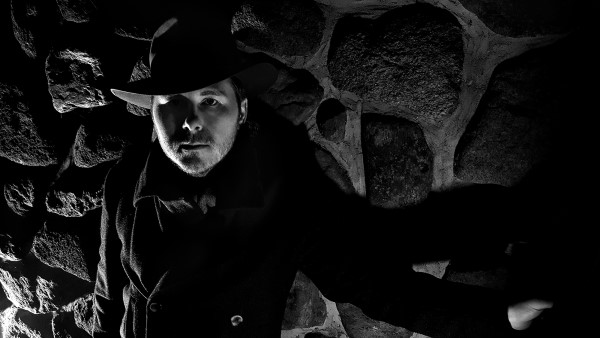 Tomaz: And in the end, I have to ask you if is Vision Eternel about to play live shows? Have you ever performed live with it?
Tomaz: And in the end, I have to ask you if is Vision Eternel about to play live shows? Have you ever performed live with it?
Alexander: A handful of Vision Eternel compositions have been performed in a public setting in the past, but there has never been a Vision Eternel concert. There was a time when that interested me; when I invited Nidal Mourad and Adam Kennedy to join the band in early 2008. However, this interest has faded with time, and I no longer feel the necessity to perform publicly. I have become somewhat of a recluse over the years, and I do not enjoy attending concerts. I always preferred studio environments and studio recordings to public performances. I would not be opposed to performing live with another band in the future, but Vision Eternel will remain a studio band.
Vision Eternel discography:
- Seul Dans L’obsession (2007)
- Un Automne En Solitude (2008)
- An Anthology Of Past Misfortunes (2009)
- Abondance De Périls (2010)
- The Last Great Torch Song (2012)
- Echoes From Forgotten Hearts (2015)
- An Anthology Of Past Misfortunes (2018, released as a boxed set)
- For Farewell Of Nostalgia (2020)
Vision Eternel links: Official website, Facebook, Twitter, Bandcamp